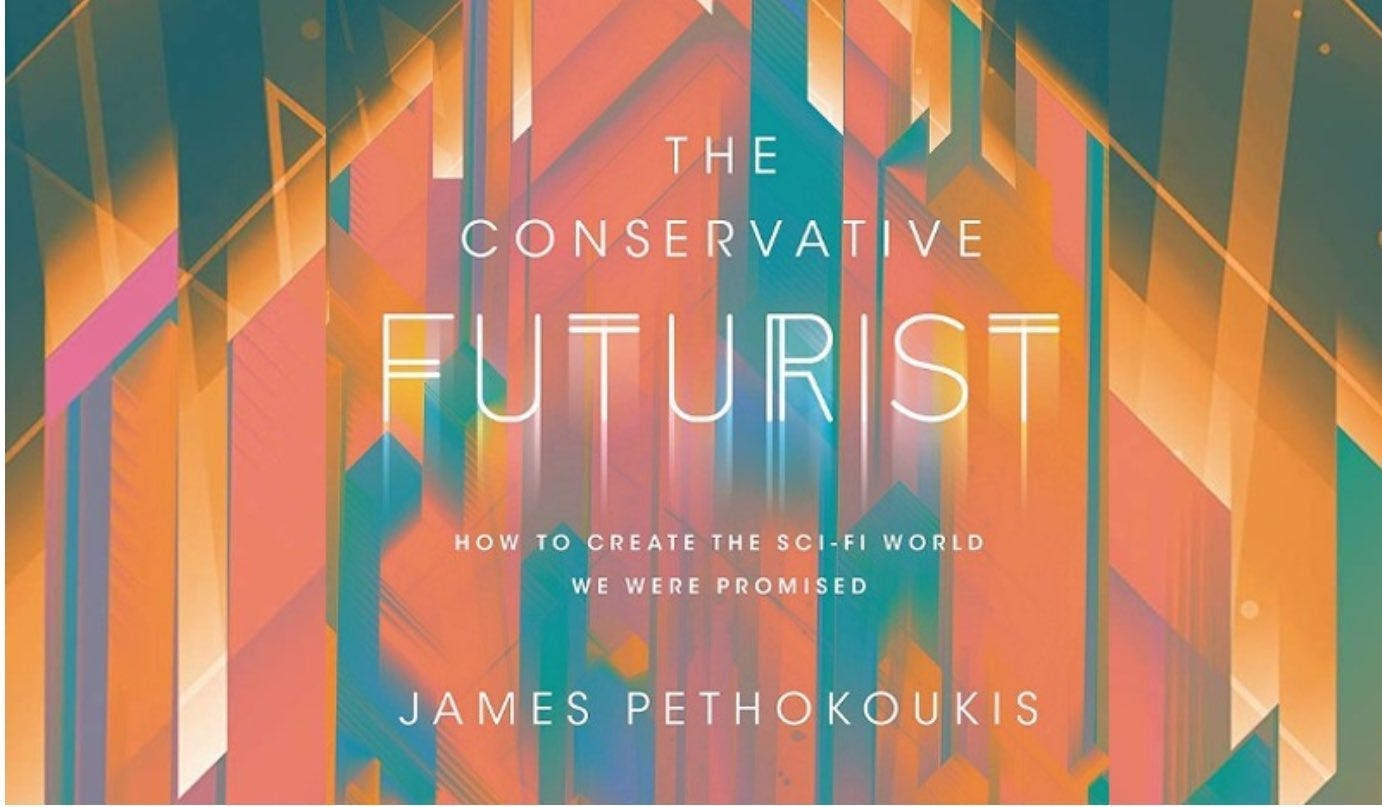Big changes are happening: space; energy; and, of course, artificial intelligence. The difference between sustainable, pro-growth change, versus a retreat back into stagnation, may lie in how we implement that change. Today on Faster, Please! — The Podcast, I talk with Virginia Postrel about the pitfalls of taking a top-down approach to innovation, versus allowing a bottom-up style of dynamism to flourish.
Postrel is an author, columnist, and speaker whose scholarly interests range from emerging technology to history and culture. She has authored four books, including The Future and Its Enemies (1998) and her most recent, The Fabric of Civilization: How Textiles Made the World (2020). Postrel is a contributing editor for the Works in Progress magazine and has her own Substack.
In This Episode
Technocrats vs. dynamists (1:29)
Today’s deregulation movement (6:12)
What to make of Musk (13:37)
On electric cars (16:21)
Thinking about California (25:56)Below is a lightly edited transcript of our conversation.
Technocrats vs. dynamists (1:29)
I think it is a real thing, I think it is in both parties, and its enemies are in both parties, too, that there are real factional disagreements.
Pethokoukis: There is this group of Silicon Valley founders and venture capitalists, they supported President Trump because they felt his policies were sort of pro-builder, pro-abundance, pro-disruption, whatever sort of name you want to use.
And then you have this group on the center-left who seemed to discover that 50 years of regulations make it hard to build EV chargers in the United States. Ezra Klein is one of these people, maybe it's limited to center-left pundits, but do you think there's something going on? Do you think we're experiencing a dynamism kind of vibe shift? I would like to think we are.
Postrel: I think there is something going on. I think there is a real progress and abundance movement. “Abundance” tends to be the word that people who are more Democrat-oriented use, and “progress” is the word that people who are more — I don't know if they're exactly Republican, but more on the right . . . They have disagreements, but they represent distinct Up Wing (to put it in your words) factions within their respective parties. And actually, the Up Wing thing is a good way of thinking about it because it includes both people that, in The Future and Its Enemies, I would classify as technocrats, and Ezra Klein read the books and says, “I am a technocrat.” They want top-down direction in the pursuit of what they see as progress. And people that I would classify as dynamists who are more bottom-up and more about decentralized decision-making, price signals, markets, et cetera.
They share a sense that they would like to see the possibility of getting stuff done, of increasing abundance, of more scientific and technological progress, all of those kinds of things. I think it is a real thing, I think it is in both parties, and its enemies are in both parties, too, that there are real factional disagreements. In many ways, it reminds me of the kind of cross-party seeking for new answers that we experienced in the late ’70s and early ’80s, where . . . the economy was problematic in the ’70s.
Highly problematic.
And there was a lot of thinking about what the problems were and what could be done better, and one thing that came out of that was a lot of the sort of deregulation efforts that, in the many pay-ins to Jimmy Carter, who's not my favorite president, but there was a lot of good stuff that happened through a sort of left-right alliance in that period toward opening up markets.
So you had people like Ralph Nader and free-market economists saying, “We really don't need to have all these regulations on trucking, and on airlines, and these are anti-consumer, and let's free things up.” And we reaped enormous benefits from that, and it's very hard to believe how prescriptive those kinds of regulations were back before the late ’70s.
The progress and abundance movement has had its greatest success — although it still has a lot to go — on housing, and that's where you see people who are saying, “Why do we have so many rules about how much parking you can have?” I mean, yes, a lot of people want parking, but if they want parking, they'll demand it in the marketplace. We don't need to say, “You can't have tandem parking.” Every place I've lived in LA would be illegal to build nowadays because of the parking, just to take one example.
Today’s deregulation movement (6:12)
. . . you've got grassroots kind of Trump supporters who supported him because they're sick of regulation. Maybe they’re small business owners, they just don't like being told what to do . .. . and it's a coalition, and it's going to be interesting to see what happens.
You mentioned some of the deregulation in the Carter years, that's a real tangible achievement. Then you also had a lot more Democrats thinking about technology, what they called the “Atari Democrats” who looked at Japan, so there was a lot of that kind of tumult and thinking — but do you think this is more than a moment, it’s kind of this brief fad, or do you think it can turn into something where you can look back in five and 10 years, like wow, there was a shift, big things actually happened?
I don't think it's just a fad, I think it’s a real movement. Now, movements are not always successful. And we'll see, when we saw an early blowup over immigration.
That's kind of what I was thinking of, it's hardly straightforward.
Within the Trump coalition, you've got people who are what I in The Future and Its Enemies would call reactionaries. That is, people who idealize an idea of an unchanging America someplace in the past. There are different versions of that even within the Trump coalition, and those people are very hostile to the kinds of changes that come with bottom-up innovation and those sorts of things.
But then you've also got people, and not just people from Silicon Valley, you've got grassroots kind of Trump supporters who supported him because they're sick of regulation. Maybe they’re small business owners, they just don't like being told what to do, so you've got those kinds of people too, and it's a coalition, and it's going to be interesting to see what happens.
It's not just immigration, it's also if you wanted to have a big technological future in the US, some of the materials you need to build come from other countries. I think some of them come from Canada, and probably we're not going to annex it, and if you put big tariffs on those things, it's going to hamper people's ability to do things. This is more of a Biden thing, but the whole Nippon Steel can't buy US Steel and invest huge amounts of money in US plants because, “Oh no, they're Japanese!” I mean it's like back to the ’80s.
Virginia, what if we wake up one morning and they've moved the entire plant to Tokyo? We can't let them do that!
There’s one thing about steel plants, they're very localized investments. And we have a lot of experience with Japanese investment in the US, by the way, lots of auto plants and other kinds of things. It’s that sort of backward thinking, which, in this case, was a Biden administration thing, but Trump agrees, or has agreed, is not good. And it's not even politically smart, and it's not even pro the workers because the workers who actually work at the relevant plant want this investment because it will improve their jobs, but instead we get this creating monopoly. If things go the way it looks like they will, there will be a monopoly US Steel supplier, and that's not good for the auto industry or anybody else who uses steel.
I think if we look back in 2030 at what's happened since 2025, whether this has turned out to be a durable kind of pro-progress, pro-growth, pro-abundance moment, I'll look at how have we reacted to advances in artificial intelligence: Did we freak out and start worrying about job loss and regulate it to death? And will we look back and say, “Wow, it became a lot easier to build a nuclear power plant or anything energy.” Has it become significantly easier over the past five years? How deep is the stasis part of America, and how big is the dynamist part of America, really?
Yeah, I think it's a big question. It's a big question both because we're at this moment of what looks like big political change, we're not sure what that change is going to look like because the Trump coalition and Trump himself are such a weird grab bag of impulses, and also because, as you mentioned, artificial intelligence is on the cusp of amazing things, it looks like.
And then you throw in the energy issues, which are related to climate, but they're also related to AI because AI requires a lot of energy. Are we going to build a lot of nuclear power plants? It's conceivable we will, both because of new technological designs for them, but also because of this growing sense — what I see is a lot of elite consensus (and elites are bad now!) that we made a wrong move when we turned against nuclear power. There's still aging Boomer and older are environmentalist types who still react badly to the idea of nuclear power, but if you talk to younger people, they are more open-minded because they're more concerned with the climate, and if we're going to electrify everything, the electricity's got to come from someplace. Solar and wind don't get you there.
To me, not only is this the turnaround in nuclear, to me, stunning, but the fact that we had one of the most severe accidents only about 10 years ago in Japan, and if you would have asked anybody back then, they're like, “That's the death knell. No more nuclear renaissance in these countries. Japan's done. It's done everywhere.” Yet here we are.
And yet, part of that may even be because of that accident, because it was bad, and yet, the long-run bad effects were negligible in terms of actual deaths or other things that you might point to. It's not like suddenly you had lots of babies being born with two heads or something.
What to make of Musk (13:37)
I’m glad the world has an Elon Musk, I'm glad we don't have too many of them, and I worry a little bit about someone of that temperament being close to political power.
What do you make of Elon Musk?
Well, I reviewed Walter Isaacson's biography of him.
Whatever your opinion was after you read the biography, has it changed?
No, it hasn't. I think he is somebody who has poor impulse control, and some of his impulses are very good. His engineering and entrepreneurial genius are best focused in the world of building things — that is, working with materials, physically thinking about properties of materials and how could you do spaceships, or cars, or things differently. He's a mixed bag and a lot of these kinds of people, I say it well compared.
What do people expect that guy to be like?
Compared to Henry Ford, I'd prefer Elon Musk. I’m glad the world has an Elon Musk, I'm glad we don't have too many of them, and I worry a little bit about someone of that temperament being close to political power. It can be a helpful corrective to some of the regulatory impulses because he does have this very strong builder impulse, but I don't think he's a particularly thoughtful person about his limitations or about political concerns.
Aside from his particular strange personality, there is a general problem among the tech elite, which is that they overemphasize how much they know. Smart people are always prone to the problem of thinking they know everything because they're smart, or that they can learn everything because they're smart, or that they're better than people because they're smart, and it's just like one characteristic. Even the smartest person on earth can't know everything because there's more knowledge than any one person can have. That's why I don't like the technocratic impulse, because the technocratic impulse is like, smart people should run the world and they tell you exactly how to do it.
To take a phrase that Ruxandra Teslo uses on her Substack, I think weird nerds are really important to the progress of the world, but weird nerds also need to realize that our goal should be to create a world in which they have a place and can do great things, but not a world in which they run everything, because they're not the only people who are valuable and important.
On electric cars (16:21)
If you look at the statistics, the people who buy electric cars tend to be people who don't actually drive that much, and they're skewed way to high incomes.
You were talking about electrification a little earlier, and you've written a little bit about electric cars. Why did you choose to write about electric cars? And it seems like there's a vibe shift on electric cars as well in this country.
This is the funny thing, because this January interview is actually scheduled because of a July post I had written on Substack called “Don't Talk About Electric Cars!”
It’s as timely as today's headlines.
The headline was inspired by a talk that I heard Celinda Lake, the Democratic pollster (been around forever) give at a Breakthrough Institute conference back in June. Breakthrough Institute is part of this sort of UP Wing, pro-progress coalition, but they have a distinct Democrat tilt. And this conference, there was a panel on it that was about how to talk about these issues, specifically if you want Democrats to win.
She gave this talk where she showed all these polling results where you would say, “The Biden administration is great because of X,” and then people would agree or disagree. And the thing that polled the worst, and in fact the only thing that actually made people more likely to vote Republican, was saying that they had supported building all these electric charging stations. Celinda Lake's opinion, her analysis of that, digging into the numbers, was that people don't like electric cars, and especially women don't like electric cars, because of concerns about range. Women are terrified of being stranded, that was her take. I don't know if that's true, but that was her take. But women love hybrids, and I think people love hybrids. I think hybrids are very popular, and in fact, I inherited my mother's hybrid because she stopped driving. So I now have a 2018 Prius, which I used to take this very long road trip in the summer where I drove from LA to a conference in Wichita, and then to Red Cloud Nebraska, and then back to Wichita for a second conference.
The reason people don't like electric cars is really a combination of the fact that they tend to cost more than equivalent gasoline vehicles and because they have limited range and you have to worry about things like charging them and how long charging them is going to take.
If you look at the statistics, the people who buy electric cars tend to be people who don't actually drive that much, and they're skewed way to high incomes. So I live in this neighborhood in West LA, and it is full of Priuses — I mean it used to be full of Priuses, there's still a lot of Priuses, but it's full of Teslas and it is not typical. And the people in LA who are driving many, many miles are people who have jobs like they’re gardeners, or their contractors, or they're insurance adjusters and they have to drive all around and they don't drive electric cars. They might very well drive hybrids because you get better gas mileage, but they're not people who have a lot of time to be sitting around in charging stations.
I think what's happened is there's some groups of people who are see this as a problem to be solved, but then there are a lot of people who see it as more symbolic than not. And they let their ideal, perfect world prevent improvements. So instead of saying, “We should switch from coal to natural gas,” they say, “We should outlaw fossil fuels.” Instead of saying, “Hybrids are a great thing, great invention, way lower emissions,” they say, “We must have all electric vehicles.” And what will happen, California has this rule, it has this law, that you're not going to be able to sell [non-]electric vehicles in the state after, I think it's 2035, and it's totally predictable what's going to happen: People just keep their gasoline cars longer. We’re going to end up like Cuba with a bunch of old cars.
I swear, every report I get from a think tank, or a consultancy, or a Wall Street bank, for years has talked about electric cars, the energy transition, as if it was an absolutely done deal, and maybe it is a done deal over some longer period of time, I don't know, but to me it sort of gets to your point about top-down technocratic impulse — it seems to be failing.
And I think that electric cars are a good example of that because there are a lot of people who think electric cars are really cool, they're kind of an Up Wing thing, if you will. It's like a new technology, there’ve been big advances, and exciting entrepreneurs . . . and I think a lot of people who like the idea of technological progress like electric cars, and in fact, the adoption of electric cars by people who maybe don't drive a whole lot but have a lot of money, it's not just environmental, cool, or even status, it's partly techno-lust, especially with Teslas.
A lot of people who bought Teslas, they're just like people who like technology, but the top-down proclamation that you must have an electric vehicle, and we're going to use a combination of subsidies and bans to force everybody to have an electric vehicle, really doesn't acknowledge the diversity of transportation needs that people have.
One way of looking at electric cars, but also the effort to build all these chargers, which has been a failure, the effort to start to creating broadband connectivity to all these rural areas — which isn't working very well — there was this lesson learned by people on the center-left, and Ezra Klein, that there was this wild overreaction, perhaps, to environmental problems in the ’60s and ’70s, and the unintended consequence here is that one, the biggest environmental problem may be worse because we don't have nuclear power and climate change, but now we can't really solve any problems. So it took them 50 years, but they learned a lesson.
My concern is to look at what's going on with some of the various Biden initiatives which are taking forever to implement, may be wildly unpopular — will they learn the risk of this top-down technocratic approach, or they'll just memory hold that and they'll move on to their next technocratic approach? Will there be a learning?
No, I'm skeptical that there will be. I think that the learning that has taken place — and by the way, I hate that: “a learning,” that kind of thing. . .
That's why I said it, because it’s kind of delightfully annoying.
The “learning,” gerund, that has taken place is that we shouldn't put so much process in the way of government doing things. And while I more or less agree with that, in particular, there are too many veto points and it is too easy for a very small group of objectors to hold up, not just private, but also public initiatives that are providing public goods.
I think that the reason we got all of these process things that keep things from being done was because of things like urban renewal in the 1960s. And no, it was not just Robert Moses, he just got the big book written about him, but this took place every place where neighborhoods were completely torn down and hideous, brutalist structures were built for public buildings, or public housing, and these kinds of things, and people eventually rebelled against that.
I think that yes, there are some people on the center-left who will learn. I do not think Ezra Klein is one of them, but price signals are actually useful things. They convey knowledge, and if you're going to go from one regulatory regime to another, you'll get different results, but if you don't have something that surfaces that bottom-up knowledge and takes it seriously, eventually it's going to break down. It's either going to break down politically or it's just waste a lot of money. . . You have your own technocratic streak.
Thinking about California (25:56)
Everybody uses California fires as an excuse to grind whatever axe they have.
But listen, they'd be the good technocrats.
Final question: As we're speaking, as we're doing this interview, huge fires raging sort of north of Los Angeles — how do you feel about the future of California? You live in California. California is extraordinarily important, both the American economy and to the world as a place of culture, as a place of technology. How do you feel about the state?
The state has done a lot of shooting itself in the foot over the last . . . I moved here in 1986, and over that time, particularly in the first decade I was there, things were going great, the state was kind of stupid. I think if California solves its housing problem and actually allows significant amounts of housing to be built so that people can move here, people can stay here, young people don't have to leave the state, I think that will go a long way. It has made some positive movement in that direction. I think that's the biggest single obstacle.
Fires are a problem, and I just recirculated on my Substack something I wrote about understanding the causes of California fires and what would need to be done to stop them.
You’ve got to rake that underbrush.
I wrote this in 2019, but it's still true: Everybody uses California fires as an excuse to grind whatever axe they have.
Some of the Twitter commentary has been less-than-generous toward the people of California and its governor.
One of the forms of progress that we take for granted is that cities don't burn regularly. Throughout most of human history, regular urban fires were a huge deal, and one of the things that city governments feared the most was fire and how were they prevented. There's the London fire, and the Chicago fires, and I remember, I just looked up yesterday, there was a huge fire in Atlanta in 1917, which was when my grandparents were children there. I remember my grandparents talking about that fire. Cities used to regularly burn — now they don't, where you have, they call it the “urban wildlife,” I forget what it's called, but there's a place where the city meets up against the natural environment, and that's where we have fires now, so that people like me who live in the concrete are not threatened. It's the people who live closer to nature, or they have more money, have a big lot of land.
It's kind of understood what would be needed to prevent such fires. It's hard to do because it costs a lot of money in some cases, but it's not like, “Let's forget civilization. Let's not build anything. Let's just let nature take its course.” And one of the problems that was in the 20th century where people had the false idea — again, bad technocrats — that you needed to prevent forest fires, forest fires were always bad, and that is a complete misunderstanding of how the natural world works.
California has a great future if it fixes this housing problem. If it doesn't fix its housing problem, it can write off the future. It will be all old people who already have houses.
On sale everywhere The Conservative Futurist: How To Create the Sci-Fi World We Were Promised
▶ Business
A lesson for oligarchs: politics can be deadly - FT Opinion
▶ Policy/Politics
Europe’s ‘super-regulator’ role is under threat - FT Opinion
Biden’s AI Data Center and Climate Contradiction - WSJ Opinion
▶ AI/Digital
▶ Clean Energy/Climate
▶ Space/Transportation
SpaceX catches Super Heavy booster on Starship Flight 7 test but loses upper stage - Space
Blue Origin reaches orbit on first flight of its titanic New Glenn rocket - Ars
▶ Substacks/Newsletters
TikTok is just the beginning - Noahpinion
Unstable Diffusion - Hyperdimensional
Progress's First Principles - Risk & Progress
After the Green New Deal - Slow Boring
Washington Must Prioritize Mineral Supply Results Over Political Point Scoring - Breakthrough Journal













